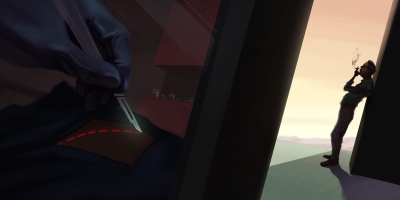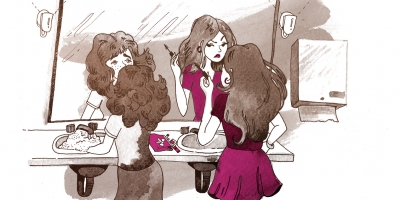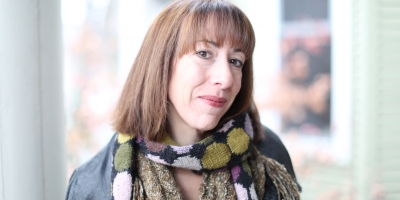In Conversation with
Gina Frangello
by Ashley Perez

Making a good first impression is a high-pressure concept. So it’s kind of amazing when you make great first impressions without realizing it. The first time I saw Gina Frangello was at an offsite reading during the 2012 AWP conference in Chicago. I was there to see Rob Roberge, a mentor of mine and, as luck would have it, one of Gina’s authors from Other Voices Books as well as her longtime friend. While Rob wondered aloud what story he should read, Gina called out from behind me and said, “Oh, read the one with the goat testicles!” Instant admiration from me.
At first, I got to know Gina peripherally: through correspondence with Rob, and then by reading her impressive array of work both in print and online. It wasn’t long, though, before our lives intersected in a more concrete way, when I was chosen to be a participant in her international writing workshop, Other Voices Querétaro, in the Querétaro province of Mexico.
I talked to Gina by phone and over email about her career in publishing, editing, teaching, and writing, as well as being a part of the literary community, and the Chicago writing scene.
Ashley Perez: Last year, you completed a multi-city promotional tour for A Life in Men, ran a successful second year of Other Voices Querétaro, wrapped up a great three-year stint as Sunday editor at The Rumpus, as well as five years with The Nervous Breakdown, where you co-launched their fiction section in 2009 and became its editor. Aside from probably being exhausted, what are you doing now, in the new year? What is the current project?
Gina Frangello: I’ve just finished a draft of a novel, Every Kind of Wanting, and am in the revision stage right now. It’s about a gestational surrogacy that a gay couple undertakes to have a child, but really the novel spans thirty years and is as much about family secrets, the nature of desire, and who owns love as it is about the surrogacy. I’m obsessed with it, but very much in that state where I’m not sure whether my revisions are going to make everything click into place or cause an explosion that will bring me back to step one.
Perez: How has your work as an editor changed who you are as a writer?
Frangello: The interesting thing about this question, Ashley, is that I have really been an editor for as long as I’ve been a professional writer.
I wrote as a child—I started dictating stories to my mother before I could write, and made her write them down, and then I’d illustrate them. By the time I was ten I was working on my first “novel” on butcher paper. And I studied creative writing some as an undergraduate and wrote an actual novel (which was later entirely rewritten and became my debut, My Sister’s Continent) in the few months following my wedding when I was twenty-five. So I had an identity as someone who writes long before I started editing professionally. But most of that writing was done in secret, in the fringes of my life, then as driven as I was by it. I was twenty-six when I began doing both things—twenty years ago. My entire adult professional identity has been about the intersections and duality of my writing and editing—there hasn’t been one, in terms of a “work” capacity, without the other.
What I know is that I would always have written. I would have kept writing even if I had never become an editor. I began writing at the age of four and never stopped; it’s how I process the world. My editing, though, helped me believe that writing could be more than a secret passion or a “hobby.” My life as an editor got me integrated into a larger literary community, and helped me meet writers from all over the country and figure out some kind of workable roadmap to what a literary life and career could look like. Growing up, I didn’t know any publishing writers, or really anyone in the arts in general. My work with Other Voices magazine, and especially founding the book press in 2004, served as a kind of professional education in which I learned by doing and found out, slowly over time, how to forge work I love into a “career.”
Perez: You’re a big advocate for bringing together diverse voices in the literary community. During your time at The Rumpus and also at your writing retreat in Mexico, you’ve connected and introduced many writers to each other, as well as to the public. What does it mean to be involved in the literary community? What do you think it takes to be a good literary citizen, and why is that important?
Frangello: When I first started editing Other Voices magazine in the mid-1990s, the term “literary citizen” wasn’t tossed around as much as it is now. At that time, almost all literary magazines were print, not online, and still existed through tangible, if difficult, ways of earning revenue, such as paid subscriptions and local and national grants like the Illinois Arts Council or the NEA. In addition, more MFA programs offered writing students the chance to go to graduate school for free, earning money for our teaching while we were working towards our degrees. The irony, of course, is that it was considered back then to be a pretty daunting prospect to try to earn any decent money as a writer—because it was. But it was—standing here twenty years on—considerably easier than it is now. We’ve seen a massive acceleration of cutbacks of things like book-review sections of newspapers and teaching assistantships offered to grad students. We’ve seen just about every major newspaper file for bankruptcy, and longform journalism has all but disappeared from mainstream media, along with the salaries it fetched.
This is a complex question because what rose up to fill the dead space in mainstream media’s literary coverage has, in the past decade or so, been nothing short of revolutionary in terms of literary culture. Literary conversations and publishing are more vibrant than they have been in decades. There are also so many thriving online publications read by hundreds of thousands of readers—or more—monthly, and both comment sections and social media enable writers who live anywhere, and who have no pre-existing “connections,” to establish relationships and a kind of online tribe of support well in advance of their own debut books, all of which has had a hugely positive impact on the diversification, globalization, and somewhat more leveled playing field of literary discourse.
There is a lot to celebrate. That all said…it has become virtually impossible to get paid. Online magazines like The Nervous Breakdown and The Rumpus and even Huffington Post don’t require subscriptions, and if no one needs to pay to read them…well, where does the money come from? The answer is advertising, of course: people pay to advertise. But often, that money goes straight back into things like site updates and upkeep, or may all go towards paying one managing editor who works virtually round the clock, leaving not only most of the part-time editors, but all the writers contributing to the magazine, frequently unpaid. In 1995, the idea that you could be an editor at a magazine that half a million people a month read, and yet you wouldn’t even be drawing a salary, would have seemed preposterous. Yet now it’s strangely common, because the subscription model is all but dead.
That’s all a very long preamble to your question about literary citizenship. Literary citizenship, though my generation didn’t apply that label per se, has been an immense part of my life both professionally and personally, and I believe in it strongly. That said, I am also someone who is married to a non-writer who has a traditional job and salary, and my husband’s steady income has allowed me for many years to focus on literary philanthropy in ways not everyone can. I’ve been very lucky. I grew up poor—not euphemistically poor, as in “compared to now,” but below the poverty line—so I understand intimately that most people, especially in the current economy, are struggling. Not everyone is in a position to give away time working unpaid for a magazine or book press!
There are others who would flip this on its head and say if a publication doesn’t pay its writers, that’s bad literary citizenship. Even if, honestly, most of the people who make claims like that are not the people who have been in the trenches of these publications. They don’t seem to understand that there isn’t any money. That there are often up to twenty editors working for free, too, to keep the endeavor afloat, and that the speed of new content, with numerous pieces going up per day, would mean that in order to pay all those writers—sometimes thousands per year—the site would need to be making a killing. [The people who make these claims] don’t know that many of the ads they see running are given away at discounts or as “swaps” for other services, because people are not exactly banging down the door to pay top-dollar for ad space. It’s extremely complex.
Efforts to point a finger at an “enemy” usually feel circular and sad to me. No one in the literary community is an enemy. Even the corporate press editors and successful agents could have made much more as attorneys or doctors. Most literary writers, who others on the outside would consider very “successful,” still have to teach or hold other day jobs. Economically, times are very tough in the arts, as they are elsewhere.
For that reason, I’m extremely hesitant to make pronouncements as to what constitutes “good literary citizenship.” People need to live their lives and stay afloat. They need to support their children and pay their bills. I don’t think someone needs to volunteer at a magazine or press, or give money to literary organizations, to be a good literary citizen.
What I think the baseline is, really, is whether or not someone is participating. I think people who want to be published, who want to be paid, who want to go on tour, who want to be interviewed—well, they need to read, for starters. They need to go to some other authors’ events, which are usually free. They need to prioritize buying books above other easy ways to blow fifteen to twenty bucks. They might ideally share things they love on Facebook or Twitter and write a comment on the original site that published an essay, saying what they love. Those things are what citizenship is about, to me. Literature is an ongoing dialogue across generations, between the living and the dead, between the breathing and the pages. You have to take part in that dialogue to best understand it, to do your own best work.
Perez: How would you like to see writers engage more in the literary community?
Frangello: At the bottom line, I would like to see more engagement in the form of more reading, including on a grassroots level. Form a writing group and read peers’ work before it’s published and offer honest, constructive feedback. Buy a book from an indie press, instead of buying a bestseller your friends all own and can loan you if you really want to read it. Think a bit off the beaten path, and discourage the groupthink that can pervade corporate publishing. Be an illustration of the fact that trade publishing houses’ marketing departments don’t know everything about what American readers want. Contribute outside the box.
Perez: You give a wonderful two-night talk at Other Voices Querétaro about the changes in the publishing industry. What is the change that you perceive to be the most frightening? And what is the change that excites you the most?
Frangello: I actually think literary culture is in better shape now than it has been in a while. Ten years ago, people were genuinely talking about whether reading—like, any kind of reading—was simply in its death throes. The publishing industry seemed to believe it was Armageddon. The rise of online literary culture has completely changed that discussion, as have other things like the explosion of YA lit and the introduction of tablets, on which books are instantly available with a single click. Talk of the imminent death of reading was not only greatly exaggerated, but proved to be the opposite of reality.
Perez: Have the changes in the publishing world affected your writing or the way you edit other people’s work?
Frangello: I’m not sure it’s impacted my own writing much, but the rise of online literary communities like The Rumpus and The Nervous Breakdown definitely impacted my direction and goals as an editor. At Other Voices Books, which I founded in 2004, and where we only published a couple of books a year, I had the truly irreplaceable experience of being able to work collaboratively and intensely over long periods of time with individual authors to bring their books into the world—from the early stages of content editing, all the way through the marketing stage. It was, on a personal, intellectual, and artistic level, just an incredibly beautiful and fun and invigorating experience.
But holy shit, was it ever difficult economically. It was so hard, with our limited funds and an unpaid staff of all of three people, to sell these books, you know? To get them distributed widely enough—to get people to know they existed, to obtain review space, to have them visible in stores. It was an exhausting and at times demoralizing process to put out a book that we all believed to be brilliant and exciting, and to in fact have critics agree with us—all four of our first four titles were nominated for or won established literary awards—and yet to have it be a major success to move even a few thousand copies of a book we’d spent two years of our lives eating and breathing. That was difficult not just for us, economically, but even more so, it was an issue of frustration at wanting to be able to do better and do more for our authors. We just didn’t have the money or the staff to bring them the readership they deserved.
And so eventually, opportunities like editing at The Nervous Breakdown and The Rumpus, which had readerships that were tens of thousands—or hundreds of thousands—simply became overwhelmingly attractive. To be able to publish some fifty writers annually on a site and offer every single one of them a huge readership was an intoxicating possibility.
Perez: You live in Chicago, which has an expansive literary scene that is not talked about as often as the ones in New York or Los Angeles. What do you love about the lit scene there?
Frangello: Well, for starters, almost nothing costs money! There aren’t a lot of “gala” affairs where you have to buy tickets, where anyone is outpriced, where you have to be part of a certain inner circle or economic sector to attend. We also have almost no “trade” industry here—it’s an indie culture, on a very deep level, which gives things a homey and egalitarian vibe. The scene is somewhat young (I feel much older here, in my forties, than I do in New York or LA’s lit scenes, actually), and tied to DIY culture and universities. The scene is thriving enough that there is usually a choice of places to go and things to do, but it’s not so thriving that if you’re giving a reading, Salman Rushdie is probably reading somewhere on the same night and no one is coming to see you.
People are approachable. You don’t have to have a book published to be known here. Curators of reading series, or people who edit locally, or just writing students who go to a lot of stuff…it’s easy to meet people, to be on the same terms as people who have puffier resumes and have been around a lot longer. I appreciated that when I was twenty-six and just starting grad school, and I still appreciate it twenty years later, now that I am part of the older guard. We have some great presses, like Curbside Splendor, that have risen from Chicago lately, and we have world-renowned writers living here, but in many ways we are a small town when it comes to book culture, in the best possible way. You don’t get lost here. Being an asshole isn’t rewarded. People help each other, consistently. The weather sucks, so it helps to be kind.
Perez: You’re an editor who wears many different hats. You’ve edited novels, short stories, essays, online content, literary journals… What is that like, to edit in so many different formats? Do you have a certain process?
Frangello: The process has been vastly different for each form. Other Voices magazine was in full swing prior to online culture becoming the dominant way of doing business. We had thirty “first readers” all over the country, and we sent them stories via post, and they sent them back with handwritten comments. Writers submitted through the mail until very close to the end of the magazine’s operations, when we had finally gone to online submissions. The thing about all that was: lead time was enormous. I mean, you submitted a story to a magazine, and it came out, like, a year and a half or even two years later. Things moved so, so slowly. Copyedits alone were a by-hand process that went through several rounds, according to a very elaborate style sheet. Running a magazine back then also involved so much more than acquiring content. You had to manage subscriptions and write people trolling for donations and thanking them for said donations, and you spent an enormous amount of time filling out grant applications, because printing the magazine was ungodly expensive. Editing at The Nervous Breakdown and The Rumpus, where not only does everything happen online but it happens pretty much at the speed of light, is very different from all that.
One very major thing that happened when the world went online is that magazines that would once have gotten, say, 3,000 submissions annually might easily now get 30,000 submissions annually. Everyone can submit at the touch of a fingertip, with no trip to the post office, no SASE, no money for postage, never leaving the house. Moving to online submissions has made it impossible for many successful publications to honestly consider every single thing in the so-called “slush pile” with equal weight. It would take an army to accomplish that. Whereas in my days at Other Voices magazine, we absolutely did read every single story over-the-transom, with the exact same emphasis, according to the exact same process. We didn’t solicit. We didn’t work very often with agents, and almost never with publicists. At TNB and The Rumpus, without solicitation or sometimes those kinds of middlemen, I could not have done the job. The number of submissions would be completely impossible to manage.
The book world is so different. Running Other Voices Books from 2004 to 2013, and birthing books with a writer from absolute beginning to end, handling things like marketing with galleys and author tours and distribution—that was an entirely different world, still. It had very little in common with either print or online magazine publishing, other than requiring an essential love of the written word. It was a more immersive, more intimate beast, with many, many heads that were all about one thing: that one book, that you lived with wholly for at least a year of your life. Of all my editing work, it was the thing I was the most passionate about, but also the most insular, with perhaps the fewest tangible rewards. Except, of course, the beautiful, magnificent fact of bringing books to life. You get to be part of what will end up being one of the hugest accomplishments of someone’s entire professional life, and there really aren’t words for what a privilege that is, and how exciting it is, and how obsessed I was with every single book I got to do.
Perez: Has playing so many roles shaped your teaching career or style in a certain way?
Frangello: No doubt it has. I read like an editor, and I probably teach like an editor. Of course I’m concerned with helping students find their voices, with supporting them and encouraging them, but I also feel they need to hear a true professional opinion of their skill set, and they need to have realistic assessments about their work’s place in the professional landscape. I try to talk to my students a lot about what the industry is like and how to achieve certain goals, the practicalities of publishing. I also believe strongly in being honest in my critiques and reading their work as an editor would, not hand-holding or misleading them. I think it’s a very valid goal to write for self-expression or catharsis, but if someone is interested in publishing, if they have the desire and plan to be a professional writer, they need to hear honest criticism and they need to understand that their peers are not limited to those in their MFA program—their peers are also the best writers working and publishing.
A friend of mine and I have a term, “student-great,” wherein a student can start to believe they’re a great writer because they’re one of the best in their program. Maybe their professors even start to think it, because they’re reading that student compared with other students, and that student’s work is a pleasure to read by comparison. But when you leave that program and submit your work to an agent or editor, no one cares if you were better than the people in your workshop who are probably never going to publish a book. They care what you have to say or offer next to, say, Rick Moody or Mary Gaitskill or Laura van den Berg or Roxane Gay. I try to make it very clear to my students that they need to push themselves, not play to their strengths, not ever feel smug or complacent—the best writer in a program is the writer who most needs to improve during their time there, who cannot afford to coast, who needs big stakes and big risks in their work to help them grow.
Perez: What is your favorite part about teaching creative writing?
Frangello: Honestly, the same things I love about editing. That joy of discovery when you find someone who really has it. When you can collaborate with that person to help make them better, to make the work better, to find the places that scare them, the unmined places that are going to cause an explosion, and go there together.
Perez: And lastly: what influences you as a writer (and editor/teacher/kick-ass human being) outside of the book world? Do you have anything that you do that helps your creative process?
Frangello: Travel. Love. My kids. Friends. I am not of the brand of writer who believes in living mostly on or through the page. My writing is hugely important to me; the life I live off the page is more important to me.





